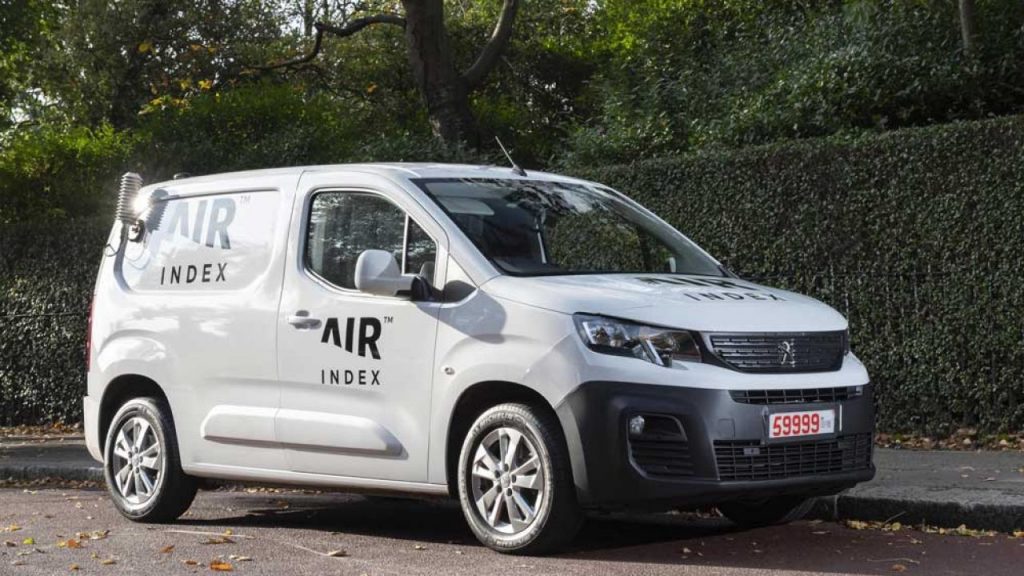‘Shocking variation’ between real-world Euro 6 diesel van emissions and lab results
A huge gap between real world emissions of Euro 6 diesel vans and laboratory-based legal limits has been revealed in new research into some of Europe’s best-selling vans.
Tests carried out by the new AIR Index rating system have found that Mercedes’ Citan has the worst emissions of the best-selling Euro 6 light commercial vehicles (LCVs) tested, emitting 17 times more NOx than Volkswagen’s Crafter, one of the lowest emitters, despite them both complying with in-laboratory Euro 6 emissions standards.
The AIR Alliance commissioned tests for 10 of Europe’s best-selling diesel light commercial vehicles using scientifically robust, on-road vehicle testing according to the latest CWA17379 methodology to give each vehicle a simple A-E colour-coded AIR Index rating, showing the difference between clean and dirty vehicles.
The resultant AIR Index is intended to help buyers and policymakers identify the cleanest and dirtiest vans, and the findings show that the 2019 Volkswagen Crafter CR35 LWB High Roof 2.0 litre is rated an ‘A’ on the AIR Index, emitting 53mg/km NOx, 72 mg less than the large-van (Class III) laboratory-based legal limit of 125mg/km, but the 2019 Mercedes Citan 109 Blue Dualiner 1.5 litre is rated an ‘E’ on the AIR Index, emitting 902mg/km of NOx, more than 8 times the (Class II) light-van laboratory-based legal limit of 105mg/km.
Meanwhile, Volkswagen’s 2018 Caddy C20 Highline TDI 2.0 litre and Peugeot’s 2019 Partner Asphalt 1.6 litre both get an ‘A’ rating, as their on-road emissions fall below the 80 mg/km laboratory-based light van limit.
The researchers behind the AIR Index also warn that in terms of urban road traffic, van emissions have a major impact on air quality simply because they are used far more than cars. The average parcel van travels between 20,000 and 30,000 miles a year, while grocery home delivery vans can cover up to 50,000 miles per annum. Vans are also the fastest-growing traffic segment, accounting for 70% of the growth in road-miles over the last 20 years.. Every day there are 65,000 unique LCV journeys into London alone and vans contribute 15% of London traffic – and a higher proportion of diesel vehicular traffic.
Nick Molden, co-founder of AIR, said: “The results of these van tests for the AIR Index continue to hammer home the fact that current policy can’t do enough to prevent damage from high emitters and treat low emitters more fairly. This is impacting air quality across in cities across Europe and is potentially costing many thousands of lives. The AIR Index gives policy makers and fleet managers information they’ve never had before enabling informed decisions about the consequences of vehicle choice.”
The results of the vans tested for AIR and rated on the AIR Index are:
x limit refers to the in-laboratory Euro standards, and NOx limits for vans vary according to vehicle by classification by weight, eg Euro 6 Class I = 80 mg/km, Euro 6 Class II = 105 mg/km, Euro 6 Class III = 125 mg/km
** provisional rating
Natalie has worked as a fleet journalist for 16 years, previously as assistant editor on the former Company Car magazine before joining Fleet World in 2006. Prior to this, she worked on a range of B2B titles, including Insurance Age and Insurance Day. As Business Editor, Natalie ensures the group websites and newsletters are updated with the latest news.
Source: https://internationalfleetworld.com
FLEET MANAGEMENT AUDIT
Fleet management is the use of a set of vehicles in order to provide services to a third-party, or to perform a task for our organization, in the most efficient and productive manner with a determined level of service and cost.
Fleet management activities are shown in the following graph 1:

Graph 1: fleet management activities
The proposal audit analyses and assesses all fleet management activities shown in the graph 1, and its main goals are:
- Know the overall status of the fleet management activities
- Provide the analysis, the assessment, the advice, the suggestions and the actions to take in order to cut costs and increase the efficiency and efficacy of the fleet management activities
With the information obtained, we’ll elaborate a report that holds the overall status of the fleet management as well as the suggestions, recommendations and the measures to take in order to cut costs and optimize the fleet management activities.
CLICK ON THE FOLLOWING LINK TO DOWNLOAD THE PROPOSED FLEET MANAGEMENT AUDIT:
Fleet Management Audit AFMC
Contact:
José Miguel Fernández Gómez
34 678254874
info@advancedfleetmanagementconsulting.com



